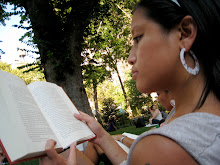
As an editor and an avid reader, the English language is my first love. I revel in words -- in the complexity of grammar, in the punctiliousness of punctuation. That is why I find my roommate’s telephone conversations with her mother endlessly fascinating. They joke, bicker, parry and banter with a fluidity that is enviable. My own conversations with my mother are stilted, awkward, tedious. The language barrier between a foreign parent and a first-generation child is one that is rarely overcome, and I really only discovered this after moving from the West Coast to the East Coast.
As a child, my grasp of the Mandarin language was much stronger than it is now, especially since it was my first language. Conversations, arguments, jokes with my mother in our native tongue were easy. Furthermore, the majority of my childhood friends were also Chinese, or Korean, Vietnamese or Japanese. I saw through their family interactions that speaking English was naturally secondary. A language barrier existed between all my friends and their parents, so I came to view that as quite normal.
As time passed and I became increasingly enamored with the English language, my Mandarin skills languished. Contrarily, I believe that was when my mother’s English-speaking skills were at their best. She vigilantly attended PTA meetings, discussed grades with my teachers, and communicated with my ballet instructors. Sure, our interactions were still a bit awkward (consisting of a healthy mix of Chinese and English, “Chinglish,” if you will), but English soon became the dominant language in our household.
Looking back now, I wonder if that caused my parents a certain measure of regret. Of course they migrated to the U.S. to provide better opportunities for their children, but I wonder if one day, my mother sat down with a heavy heart, not sure of when the exact moment her family became “Americanized,” but knowing with a weighty certainty that it had.
In high school, I was dead set on moving to the East Coast for college. My parents were wonderful -- especially my mother -- and they encouraged me to research as many opportunities as possible. In the end, I decided on Boston University. To say the move was unsettling is quite the understatement. I mean, think about it. I left the bubble-like enclave of Asian-dominated Irvine, California, to go to a vast and confusing melting pot. The very first person I met at BU happens to now be my roommate. And I can safely say that she was and is my first non-Asian best friend.
It was through her that I first witnessed what it’s like to be on the same language-level as one’s parents. Seeing her interact with her mother -- being able to use words seemingly simple, but impossibly strange to my own parents -- was startling. I admit that I came to resent my parents for a while. Why did they have to move to the U.S. and impose this frustrating impediment on my childhood, on my relationship with them?
Nevertheless, I did my best to keep up my Mandarin-speaking conversations with my parents. I took a Mandarin course at college for a year or two, and I know my mother was absolutely thrilled, diligently helping me with my homework almost every night.
Several years have passed and I am now living in New York City, working as an editor. I think it’s safe to say that I’ve never been more removed from my heritage. I deal all day, every day with the English language, with its myriad and infinite intricacies. Mandarin now sits on a dusty corner shelf of my brain. Out of my closest friends, one is Chinese and the rest are mostly Caucasian. Not to say that that’s in any way negative. I mean it’s certainly one of the reasons why I wanted to leave the West Coast in the first place, to branch out and explore what a vastly different world had to offer me. However, lately I have begun to yearn for a return to my roots, to my culture.
Yes, I envy my roommate’s easy conversations with her mother, but I am also proud of the ones I have with my own. I am proud because we always try our best to communicate, even if it means transcending the barrier of language. Of course we often lose our patience with each other, but when an understanding is reached, and we are as one, that moment can be exquisitely beautiful. I love my heritage, and I’ve even come to love how difficult it can make things. But that is, in essence, the beauty of my East-to-West-to-East life.











